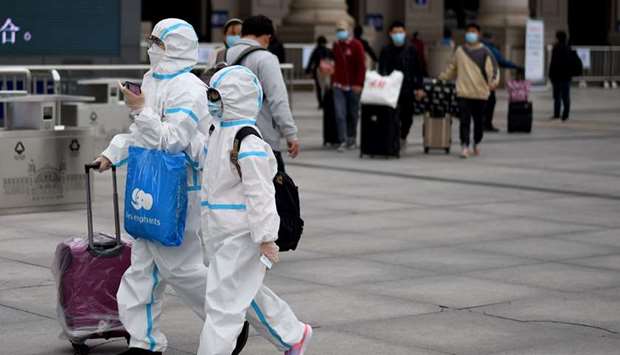Tough curbs imposed in China since January have reined in infections sharply since the height of the pandemic in February, although it has spread worldwide to infect 1.6mn people with 100,000 deaths.
But Chinese authorities fear the possibility of a second wave triggered by arrivals from overseas or asymptomatic patients.
“We can’t say that there is no such potential risk,” said Wang Xinghuan, president of Wuhan’s Leishenshan hospital, its second built especially for virus patients.
While some experts do not expect a big second wave, thanks to China’s stringent controls, the possibility could not be ignored, he told reporters.
“At present, from the hospital perspective, our understanding of the virus is still very insufficient,” Wang said, during a hospital tour organised by Wuhan officials.
For instance, it was not immediately clear how infectious asymptomatic people were, he added.
Doctors in China have seen some differences in virus behaviour from that experienced in Europe and the United States, said Zhao Yan, a doctor at Wuhan’s Zhongnan Hospital.
“The most obvious one is that in Europe and the United States quite a few people lost their sense of taste and smell, (but) we saw very few such cases,” Zhao told reporters.
The National Health Commission said 46 new cases were reported on Friday, including 42 from abroad, up from 42 a day earlier, as Hubei province, whose capital is Wuhan, reported no new cases for a seventh successive day.
Of the new imported cases, 22 were in the northeastern province of Heilongjiang, where Chinese nationals crossing over the border from Russia figured in a recent spike in cases.
Provincial health officials said all the new imported cases also involved such instances, though the province had one new local case in its capital, Harbin.
Elsewhere, Inner Mongolia had a daily tally of 27 new imported cases by Saturday morning, also all from Russia, the region’s health authority said.
The region’s city of Manzhouli, along the border with Russia, said it was preparing a new hospital to treat virus patients that would be completed on Tuesday.
The rise in cases from abroad has spurred authorities in the southern city of Guangzhou to step up scrutiny of foreigners, ordering bars and restaurants not to serve clients who appear to be of African origin, the city’s US consulate said.
Anyone with “African” contacts faces mandatory virus tests followed by quarantine, regardless of recent travel history or previous isolation, it said in a statement, advising African-Americans or those who fear being targeted to stay away.
China detected 34 new asymptomatic cases on Friday, down from 47 the previous day, according to the health commission.
Mainland China’s tally of infections now stands at 81,953. The death toll rose by three on Friday to 3,339.

